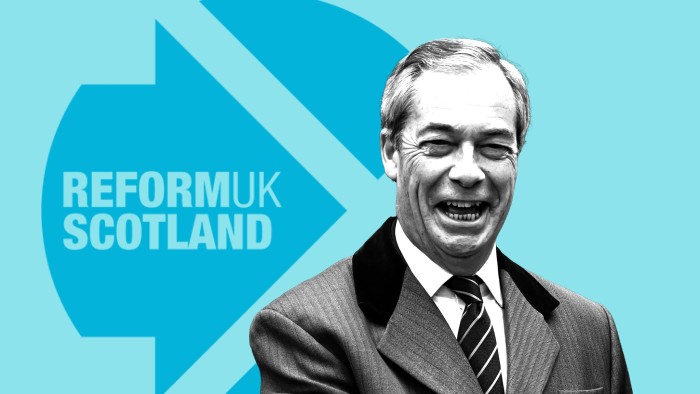Reform UK’s membership surge has reached 7,000 in Scotland, surpassing the Scottish Conservatives’ last recorded tally and complicating the political calculus ahead of parliamentary elections at Holyrood in 2026.
Reform, hoovering up new members across Britain, has been riding a global populist wave — even if the party’s leader, Nigel Farage, has come under fire from Elon Musk, who has attacked the UK government over divisive culture-war issues, including grooming gangs.
John Swinney, Scotland’s first minister and Scottish National party leader, last week urged opposition parliamentarians to stop the forces of anti-politics by backing his Budget.
“If the Budget doesn’t pass, then I think we’re playing right into the hands of Elon Musk and other populists,” he said.
Reform politicians are targeting Scottish voters by linking what they call “insane” policies pursuing a net zero target for greenhouse gas emissions with the underperforming economy.
At Reform’s Scotland conference in December, the gathered throngs in Perth reserved their greatest opprobrium for UK energy secretary Ed Miliband.
“Section him,” heckled a woman sporting a red Donald Trump “Make America Great Again” campaign cap at a mention of Miliband, the man who is leading the Labour government’s plans to expand renewable energy to decarbonise the electricity grid by 2030.
The rightwing populist party is also challenging metropolitan attitudes to race and gender which it says have captured the political establishment from Westminster to Holyrood.
Reform’s rapid rise north of the border has stunned established parties, challenging the Conservatives for third place after the ruling Scottish National party and Labour.
Recent polling by Survation and Norstat suggests the party could win 11 per cent of parliamentary seats in Holyrood’s 2026 election.
“We have got the momentum,” Richard Tice, Reform’s deputy leader, told reporters. “Our vote share is going up big time here in Scotland.”
In 2013, Farage — then leader of the pro-Brexit UK Independence party — had to hide in an Edinburgh pub to avoid protesting students and anti-racism and pro-independence campaigners.
Reform is now establishing a network of branches across the country to develop on-the-ground campaigning infrastructure.
The process has had snags: in December, Reform expelled an organiser in Scotland after claims of family links to unionist violence during the Troubles in Northern Ireland.
The party has nonetheless grown in confidence since securing five Westminster seats on 14 per cent of the vote during the UK general election last year. Farage, buoyed by the victory of his friend President Donald Trump, believes he can ride a populist wave into Downing Street.
The staunchly unionist party hopes to become the natural home for Scottish Conservatives and peel away voters from Labour, and even the SNP, by pledging to ditch renewable energy in favour of more oil and gas exploration and onshore shale fracking.
From a standing start, Reform has made strides in local authority elections, including taking 18 per cent of the vote in north-east Glasgow in November.

“If you want to get better off, vote Reform; if you want to be poorer, vote SNP,” said Tice.
The UK’s ageing North Sea oil and gas basin employs up to 90,000 people in north-east Scotland, many of whom feel their jobs are under threat as the government prioritises renewable energy.
“The first thing is to scrap the lunacy of net zero, which is having the greatest impact here with the destruction of the oil and gas industry,” said Tice, referring to Scotland’s 2045 net zero target.
“No other nation with such huge energy treasure would take the negligent decision to leave it there,” he added.
Across Scotland, new energy infrastructure is being planned to transmit offshore wind power southwards, stoking fears of a blighted landscape.
Aberdeenshire councillor Laurie Carnie, who defected to Reform from the Conservatives in October, said there were “significant concerns” about the proposed pylons in her area.
Anger at the so-called industrialisation of the countryside is compounded by rising bills, with Reform tapping into resentment at energy costs.
“Everyone is feeling the cost of living in Scotland, especially those finding it hard to heat homes in winter,” said David Stark, chair of Reform’s North Lanarkshire branch.
Tessa Khan, executive director of Uplift, which supports a transition away from oil and gas production, said high energy bills are caused by the UK’s dependence on expensive gas.
“Clean power is our path to energy security, but it could also provide many of the jobs needed for Scotland’s energy workforce,” she said.
With Holyrood’s proportional voting system, unlike Westminster’s first-past-the-post system, Reform should secure a tally of MSPs commensurate with its voting share.
“Reform seem bullish, with good reason,” said pollster Mark Diffley, who forecast that the party could have 10-15 MSPs after next year’s elections. “This would leave the party in a position of significant influence in a parliament that is likely to have no clear majority party in control.”

Reform officials recognised the need to tailor rhetoric on immigration for the Scottish electorate, given a more welcoming attitude to foreign labour in an economy plagued with job vacancies.
“Smart immigration”, according to Tice, could allow “different numbers in different places”, but with higher pay to encourage people to fill gaps in the labour force.
Back in the packed hotel auditorium at Reform Scottish conference, the audience reacted enthusiastically to Zia Yusuf, Reform’s chair, who was born in Bellshill, North Lanarkshire, to Sri Lankan immigrants.
Yusuf took aim at his fellow Muslim of south Asian heritage, Humza Yousaf. The former SNP first minister in a 2020 parliamentary speech characterised the dominance of white people in senior positions as structural racism.
“There is nothing wrong whatsoever with being white,” Yusuf assured the largely white, largely elderly conference crowd.
He followed up by channelling Martin Luther King Jr: “Reform doesn’t care about the colour of your skin but cares deeply about the content of your character.”



